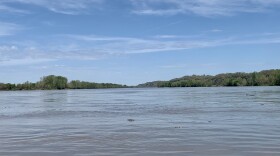-
Restoring woodlands and protecting undeveloped areas near the Blue River and its creeks are a few of the steps that could mitigate pollution and flooding.
-
Southwest Kansas farmers have a tough task: Decide on a plan to reduce their irrigation or have the state decide it for them. Groundwater Management District 3 is proposing an unprecedented districtwide conservation area. But a lot of farmers think there are some holes in this plan.
-
Groundwater in western Kansas is a precious commodity. Hays and Russell are back in court to defend a plan to transfer water from a ranch in another county.
-
A volunteer-led Stream Team is using kits to test their local waterways quarterly for phosphorus, ammonia and nitrogen, and survey for small aquatic species, such as clams, snails and insect larvae. Otherwise, funding cuts means that nobody is looking out for Missouri's water health.
-
Next year, Kansas City’s only drinking water treatment plant will celebrate its 100th birthday. It’s a milestone worth applauding, for sure, but it’s also a reminder that the city has only one place where it makes clean water.
-
For nearly a century, the city’s drinking water purification process has taken place with few major hiccups at a lone Briarcliff facility. But KC Water leaders say maintenance costs are climbing and aging concrete is a concern. They’re urging support for a new treatment plant in Kansas City.
-
The program provides a long-term look at water quality in some of Missouri's most famous lakes. It will end in 2027 after a state agency will no longer provide federal funding.
-
An ARPA grant from the Missouri Department of Natural Resources allowed the city to invest $5 million to restore the Blue River. Once a favorite for outdoor recreation in Kansas City, the river has become polluted as a result of urbanization.
-
State officials say Missouri's current standards, last revised a quarter century ago, are based on outdated science. For small rural communities, it could require major upgrades for water treatment facilities.
-
Quick-growing blooms of bacteria and algae have long been a hazard in lakes and rivers, because of the toxins they produce. Fueled in part by agricultural runoff, these blooms are also threatening public water systems, making water temporarily unusable, and forcing some cities and towns to take costly preventive measures.
-
A proposed data center caused a public outcry in recent weeks in St. Charles, Missouri, with residents criticizing the secrecy around the project and its potential to contaminate water.
-
A recent study found that some beer produced in the U.S. — including in St. Louis — contains PFAS, which are human-made compounds that accumulate in the human body and don't easily degrade. Studies have indicated the presence of PFAS in St. Louis-area water.
Play Live Radio
Next Up:
0:00
0:00
Available On Air Stations












